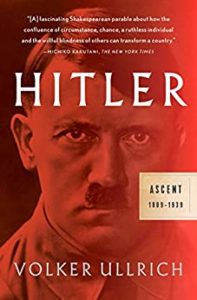At a time when democracy is faltering around the world, this brilliant book makes salutary and scary reading.
The author’s aim in the first of two volumes is to strip away myths from Hitler and see him as the individual he was, not just a giant of megalomania and crazed antisemitism. He was petty, vicious, paranoid, deft at spotting anyone’s weaknesses and exploiting them, cruel, socially awkward and proudly uncomfortable with his social betters. The pages describing his rage dealing with the King of Italy and the royal court on a state visit are truly hilarious and bizarre. Likewise, it is beyond satire to read about his obsession with flower arrangements at meals and how he stupefied dinner guests with his endless speechifying.
Ullrich takes time in his introduction to survey the major biographies of Hitler and demonstrate quite clearly that they all have one way or another failed to see Hitler in the round because of their narrow focus. His focus is global and mesmerizing. The author is especially good at laying out the complex political currents during the Nazi party’s rise to power and exploring the widespread German longing for a savior. The quasi-religious nature of Hitler’s regime and the ways in which he was basically worshiped by millions as a messiah may remind readers of more current leaders who are also brutally larger than life–and yet very small.
Hitler was a chameleon, a talent actor and a brilliant orator, which readers who have only seen snippet of his speeches and don’t know German cannot appreciate. Ullrich does a superb job of analyzing one crucial speech after another to demonstrate Hitler’s dark brilliance. And he’s just as deft at eviscerating the army of toadies and sycophants Hitler surrounded himself with. Here, the recently available diaries of Goebbels serve as stunning evidence of the hero-worship Hitler thrived on.
A passage near the end sums up his dark talents and how they meshed with the time and the damaged nation he would lead to disaster:
“Never stop–that was the law by which the National Socialist movement and its charismatic Fuhrer operated and which gave the process of coming to and consolidating power its irresistible dynamic. After the great foreign policy triumphs of 1938 [which included dismembering Czechoslovakia], Hitler never for a moment considered taking an extended break and being satisfied with what he had achieved, as Bismarck had done after 1871. He constantly needed new victories to compensate for nascent popular dissatisfaction and to bolster his own prestige. As a result, he was willing to take ever greater risks, and his fear that he would die young lent further urgency and impatience to his expansive activism. Hitler both drove events and was driven by them.” ★★★★★
Lev Raphael is an American pioneer in writing about The Second Generation, the children of Holocaust survivors. He’s the author of My Germany and 26 other books in many genres. Special Archives at Michigan State University’s library collects his literary papers.

